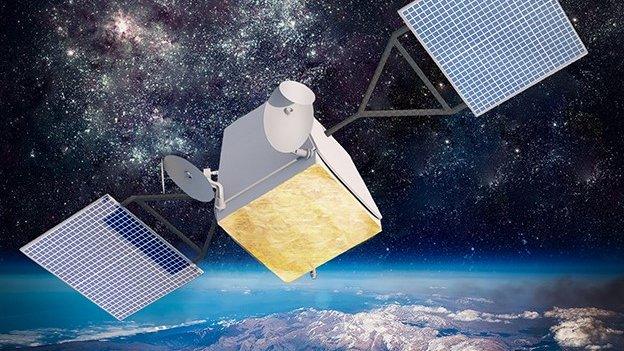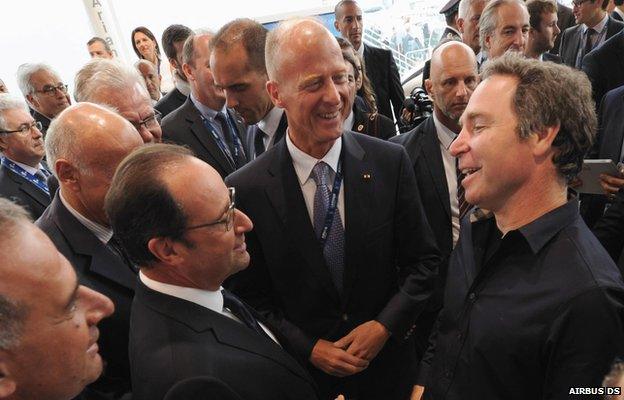Airbus to build giant satellite network
- Published

OneWeb aims to broaden internet access across the world
European aerospace giant, Airbus, is going to build the world's largest satellite constellation.
The company will produce 900 spacecraft for OneWeb, external, a British Channel Islands-registered concern that aims to broaden internet access to the underserved.
More than 600 satellites will initially be launched, with the rest held as spares.
The deal was announced at the Paris Airshow.
The multi-billion-dollar OneWeb constellation will dwarf any previous commercial network in the sky by a factor of 10.
Airbus will be the "industrial partner" on the project. And the role represents an immense challenge, because Airbus has made its name on some of the world's highest specification and most expensive telecommunications platforms.
In contrast, its workflow for OneWeb will have to be high volume at an extremely low cost.
Step-change in thinking?
Each satellite is expected to be about 150kg is size, and OneWeb was reportedly looking for a price per unit of less than half a million dollars.
Airbus, external says it will make the first 10 spacecraft at its Toulouse manufacturing facility before shifting work to a dedicated plant in the United States.
Many rockets will be required to get the constellation in orbit, and that is likely to involve Richard Branson's Virgin Group. As well as sitting on OneWeb's board, Sir Richard is also developing a satellite launch system based on his tourist spaceplane concept.
Airbus would not give a formal interview at the airshow but issued a statement from its head of space systems.
“This partnership is a fantastic new chapter in our space story,” said François Auque.
“Teaming with OneWeb with a requirement to produce several small satellites each day has inspired us to develop innovative designs and processes that will dramatically lower the cost in large volumes for high performance space applications.
“Without doubt, this programme is challenging but we’re ready for it because we have leveraged resources and expertise across the entire Airbus Group.”

French President François Hollande (L) and Airbus Group CEO Tom Enders (C) meet Greg Wyler (R)
OneWeb is led by Greg Wyler, and the American entrepreneur was pictured meeting French President François Hollande at the Le Bourget showground.
Mr Wyler started the O3B satellite network a few years ago. This is a 12-spacecraft constellation providing “backhaul” telecommunications services, also in broadband-underserved countries.
But Mr Wyler’s OneWeb venture is a step-change in thinking.
The plan envisages 20 planes of low-orbiting satellites connecting to small user terminals on the ground. These terminals would act as hubs, linking phones and computers.
Satellite constellations, it has to be said, have a rather chequered history.
Even some of today’s big players, like satphone service providers Iridium and GlobalStar, got themselves into enormous financial trouble when building their first-generation networks.
OneWeb will have to raise hundreds of millions of dollars to maintain a venture that will not be fully operational for some years.
Money was not mentioned in Monday's Airbus announcement. The description of the company as an "industrial partner" suggests it will be investing some of its own cash in the project. It did say that no launches were envisaged before 2018.